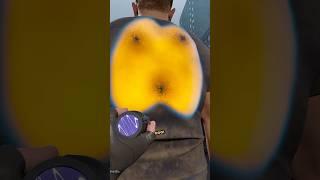Комментарии:

❤ Nice jig
Ответить
Love the concept. Now I want a KBPFJ
Ответить
no water?
Ответить
Have done one similar that was literally just a metal rod ziptied to the finger file, and same pivot setup.... It worked more than well enough to get the rough profile worked in fast. Yes, without much further refinement, the finish will always be "rough" and require finer attention, but, even without over engineering it, it makes so much more sense spending 10 minutes on this then finishing up with a filing jig, than hours trying to hog off material
Ответить
Only issue I see is needs a coolent
Ответить
Funny enough a friend and I had the same idea about 2 years ago but never came to build a test rig, as there was a break-in into his garage and they took a shitton of tools, including the Ryobi finger sander -.-
I am really glad you worked out a working design and would like to follow up on that if it turned out more to your liking in the past year.
Thanks for sharing your experience, that encourages me to build a matching jig for myself :)

brilliant idea,i have a 2x72 grinder but will definitely give this a go, a sub and looking forward to your improvements on the jig, regards from the u.k.
Ответить
Love the concept! Keep up the good work man!
Ответить
Great idea, cheaper than a big belt sander😃
Ответить
Can you do this without a file? I have a lot of wet stones but I need to make a new bevel plz help
Ответить
Fascinating!
Ответить
Liked and subscribed 😎👍
Ответить
I've often wondered about something like this. Props for bringing it to life.
Ответить
Built one similar but more refined fourty-odd years ago, worked slick.
Ответить
It will only cost ya 400 bucks per knife for those tiny belts. 😂
Ответить
You may have difficulty in finding higher grit belts for finishing the grinds post heat-treat. Other than that, I don't see any problem
Ответить
It’s crazy how many negative comments are in the comment section. This man said, “hey I think I can make a better mouse trap.” Then he did it and it works. Awesome job!
Ответить
Learning how to freehand grind should be at the top priority list for knife makers. Theres not much skill in using a jig. Learning control over your machine is important
Ответить
Sir, this is genious! As a just starting knife maker wondering about belt grinders and files, this is exactly what I am looking for!
Ответить
No way to keep the blade cool while grinding????😂
Ответить
Like someone else said you just need a grinding jig like Walter Sorries shows you how to make out of a piece of angle iron.👍
Ответить
That was a pretty cool gadget!
Ответить
👍
Ответить
Brilliant. I just hav a 1” wide harbor freight grinder. Grinding bevels with it is a pain in ass. Getting better with it though.
Ответить
My Dad hollow ground knifes with a stone on a table saw.
Ответить
Inventive grinding jig! I like those little sanders. I started freehand grinding when all I had was a 1x30 from Harbor Freight. It has paid dividends now that I upgraded to a 2x72. It is a good skill to have along with other methods.
Ответить
This method does not allow you to manage keeping edge centered without removing the blade to eyeball it. A knife grinding jig keeps the edge up so you can manage this aspect of the grind. Paying attention to the grind is everything
Ответить
I really like the idea I struggle grinding with a belt grinder too
Ответить
hahhah the KBPFJ, great content sir. well done
Ответить
Any thoughts on improving the platten on that little sander? I have a similar looking WEN and there's flatish support under part of the belt but about an inch from the tip wheel is slack.
Ответить
Video 2 please!
Ответить
Your music is TOOOOOO LOUDDDDDDDDDDD !
Ответить
I would have enjoyed the video if it wasn't for the hideous music.
Ответить
That's a frigging abomination, RIGHT ON!
Ответить
How do you accurately calculate the angle, its not just a line, its the whole thickness height of the settup.
Ответить
The reason that there's an issue out toward the tip is because the tip curves upward, toward the grinder support post. As the grinder rides along that upturned end, the angle of the grind is increasing, so the top edge will indeed move downward. Said another way, if the grind angle is set to, say, 20 degrees along the straight portion of the blade, it's more like 18 degrees at the upturned tip. The grind angle is steeper, so is shorter, just as you're seeing.
Ответить
Brilliant!!!
Ответить
Friggin brilliant! If you dial this in, you could really have something!! Also, if you could somehow turn the blade around, you may be able to do a hollow grind.
Ответить
Very clever idea! I'll be interested to see how it shapes up (no pun intended).
Ответить
Go freehand, problem solved.
Grind like this takes me about 5 minutes per side to establish, and maybe another 5 to finish.
There is no other way that is faster in handmaking a knife than a freehand grinding.

You have my attention... Come on Nikola, pave your way 🤔
Ответить
Good thinking!
Ответить
I’m a hobbyist knife maker. I don’t have a machine shop. I bought a pvc 1x4 and cut it into 8 pieces. I cut each piece at an angle on my table saw starting at 24 degrees and going down in 3 degree increments. I bar clamp my blade blank to the desired edge bevel and grind it. Very simple but it works and I can see the edge as I’m grinding.
Ответить
And this is the last video?
Ответить
Love it....
Ответить
You could also use a mirror on the 2x72 to see what you're doing if you want to got the belt grinder route. It's something I picked up while watching pottery videos
Ответить
That is crazy I thought I was the only one that thought to make a grinder like this. 😮
Ответить
If you have time and are willing to share how did you build that bevel grinder?
Ответить
Trabalho excepcional! Deus te abençoe!! 🙏🏻
Ответить


























